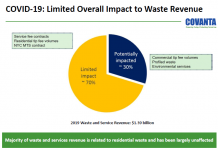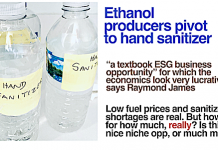by Debra Fiakas CFA
Among the surviving public ethanol producers in the U.S. is REX American Resources (REX: NYSE). Based in Ohio, REX American is an ethanol fuel producer with owned nameplate capacity near 215 million gallons per year. Additionally, the company distributes by-products of the ethanol production process, including distiller grains and non-food grade corn oil. REX has full or partial ownership in six ethanol production plants located in the Ohio, South Dakota, Illinois and Minnesota.
The company relies on corn feed stock for its dry milling ethanol production process. Like any other ethanol producer, that puts REX American in a vulnerable position if corn prices rise faster or to an egregious high level relative to fossil fuels, which help determine ethanol selling prices. This is called the ‘crush spread’. REX uses forward commodity agreements to lock in raw materials prices as well as ethanol selling prices. However, these fixed price contracts typically do not last more than three or four months.
REX management has done a fairly good job of handling the ‘crush spread’. In the twelve months ending April 2017, the company recorded $466.7 million in total sales, providing $34.0 million in net income or $5.16 per share. Importantly, the company turned 17.9% of each revenue dollar into operating cash flow. The strong cash conversion rate has helped build cash balance at the end of April 2017 to $181.9 million. With no debt, REX American has one of the strongest balance sheets among companies in the ethanol sector.
REX American stands out among small-cap companies – habitually profitable, naturally cash generative and capital conservative. However, we do have some concerns about management’s ability to act decisively or to take bold or aggressive action in their market. The balance sheet is fully capable of supporting debt to finance acquisitions or new build ethanol production. However, there are no concrete plans for such expansion.
Cash assets are now greater than the book value of the Company’s property plant and equipment. Management’s investment plans are increasingly under scrutiny. While management describes plans to expand capacity, these are very small investments relative to the total cash resources.
Although the management team might not be as culturally agile as most small, innovative companies, the REX American group can be admired for its conservative nature. Conservatism has helped build a frugal operating structure that generates strong operating cash flows. In the end it is shareholders who benefit from management’s penchant for staying the course with proven strategies rather than taking bold actions.
At a price-earnings ratio of 21.3 times the current fiscal year consensus estimate, the stock appears priced well above its peers in the ethanol industry. This should give investors pause. The ethanol industry is subject to considerable uncertainty, which is not supportive of premium valuations. For example, in November 2016, the U.S. Department of Environmental Protection announced the 2017 requirement of 15.0 billion gallons for conventional renewable fuels. This equals the statutory requirement. Despite this action well before the end of the calendar year, the ethanol market did not benefit from the expected certainly but was instead roiled by a temporary moratorium imposed by the Trump administration.
REX shares are rated at Trim by Crystal Equity Research given that fundamental valuation is at an egregious premium that may not be sustained. The stock has shown considerable strength in trading in recent weeks. Should the stock go through another retreat, tradings might be tempted to add to overall positions.
Neither the author of the Small Cap Strategist web log, Crystal Equity Research nor its affiliates have a beneficial interest in the companies mentioned herein. As of the date of this article, Crystal Equity Research has a Trim rating on REX shares.








